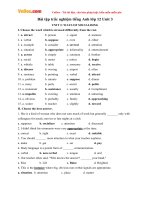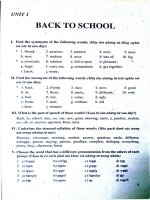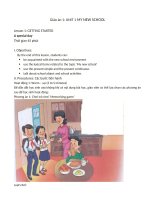Unit 1 Bai tap Tieng Anh 8
Bạn đang xem bản rút gọn của tài liệu. Xem và tải ngay bản đầy đủ của tài liệu tại đây (155.01 KB, 7 trang )
Chào các bạn, hiện nay nhằm hỗ trợ cho việc giảng dạy và dễ dàng soạn bài giảng và in ấn, nên
mình đã đánh WORD(.docx) (khơng phải file PDF) của các sách:
LỚP 6
Bài tập Tiếng Anh 6 (Lưu Hoằng Trí)
Bài tập Tiếng Anh 6 (Vũ Thị Phượng)
Bài tập Tiếng Anh 6 (Bùi Văn Vinh – Chủ biên)
Bài tập Tiếng Anh 6 - Tập 1 (Mai Lan Hương - Hà Thanh Uyên)
LỚP 7
Bài tập Tiếng Anh 7 (Lưu Hoằng Trí)
Bài tập Tiếng Anh 7 (Vũ Thị Phượng)
Bài tập Tiếng Anh 7 (Bùi Văn Vinh – Chủ biên)
Bài tập cuối tuần Tiếng Anh 7 - Tập 1 (Đại Lợi) (kèm file nghe)
Bài tập cuối tuần Tiếng Anh 7 - Tập 2 (Đại Lợi) (kèm file nghe)
LỚP 8
Bài tập Tiếng Anh 8 (Lưu Hoằng Trí)
Bài tập Tiếng Anh 8 (Đại Lợi – Hằng Nguyễn)
Bài tập Tiếng Anh 8 (Bùi Văn Vinh – Chủ biên)
LỚP 9
Bài tập Tiếng Anh 9 (Lưu Hoằng Trí)
Bài tập Tiếng Anh 9 (Bùi Văn Vinh – Chủ biên)
Bài tập Tiếng Anh 9 - Tập 1 (Mai Lan Hương - Hà Thanh Uyên)
Bài tập cuối tuần Tiếng Anh 9 - Tập 1 (Đại Lợi) (kèm file nghe)
Bài tập cuối tuần Tiếng Anh 9 - Tập 2 (Đại Lợi) (kèm file nghe)
LỚP 10
Bài tập Tiếng Anh 10 (Lưu Hoằng Trí)
Bài tập Tiếng Anh 10 (Đại Lợi – Hằng Nguyễn)
Đây hồn tồn là bản word do mình tự đánh lại toàn bộ. TUY NHIÊN
HIỆN NAY MỘT NGƯỜI KHÁC VỚI SĐT: O937.351.107 (ZALO NGUYỄN
TẤN TRUNG) ĐÃ ĂN CẮP SAO CHÉP CÁC BẢN WORD CỦA MÌNH ĐỂ
BÁN LẠI. MỌI NGƯỜI CẨN TRỌNG.
Mong mọi người cẩn trọng nếu có nhu cầu mua file word sách.
Mình chỉ sử dụng duy nhất 1 gmail:
Hi vọng các bạn ủng hộ để mình có thêm động lực cho ra đời các bản word khác nữa nhé.
Mọi thông tin liên hệ:
Gmail:
***
Cảm ơn các bạn đã đọc. Mình xin tặng Unit 1 - Bài tập Tiếng Anh 8 (Bùi Văn Vinh)
1
UNIT 1: LEISURE ACTIVITIES
2
Unit
1
LEISURE ACTIVITIES
PART 1: vocabulary and GRAMMAR REVIEW
A. VOCABULARY
Word
Type
Pronunciation
Meaning
adore
(v)
/əˈdɔː/
yêu thích, mê thích
addicted
(adj)
/əˈdɪktɪd/
nghiện (thích) cái gì
beach game
(n)
/biːtʃ ɡeɪm /
trị thể thao trên bãi biển
bracelet
(n)
/ˈbreɪslət/
vịng đeo tay
communicate
(v)
/kəˈmjuːnɪkeɪt/
giao tiếp
community centre
craft
(n)
(n)
/kəˈmjuːnəti ˈsentə/
trung tâm văn hố cộng đồng
đồ thủ công
craft kit
(n)
/krɑːft kɪt/
cultural event
(n)
/ˈkʌltʃərəl ɪˈvent/
bộ dụng cụ làm thủ cơng
sự kiện văn hố
detest
(v)
/dɪˈtest/
ghét
DIY
(n)
/diː aɪ ˈwaɪ/
đồ tự làm, tự sửa
don’t mind
(v)
/dəʊnt maɪnd/
khơng ngại, khơng ghét lắm
hang out
(v)
/hỉŋ aʊt/
đi chơi với bạn bè
be hooked on sth
(phr)
/bi hʊkt ɒn/
đam mê/nghiện cái gì
It’s right up my street!
(idiom)
/ɪts raɪt ʌp maɪ striːt/
Đúng vị của tớ!
join
(v)
/dʒɔɪn/
tham gia
leisure
(n)
/ˈleʒə(r)/
sự thư giãn nghỉ ngơi
leisure activity
(n)
/ˈleʒə ækˈtɪvəti/
hoạt động lúc rảnh rỗi
/krɑːft/
B. GRAMMAR REVIEW
GERUNDS: Danh động từ
I. FORMATION (Cách thành lập)
Danh động từ (gerund) được thành lập bằng cách thêm ING sau động từ thường.
Ex: to go - going; to think – thinking; to read - reading; to swim - swimming, etc...
II. USES (cách dùng)
3
UNIT 1: LEISURE ACTIVITIES
1. Subject (Danh động từ làm chủ ngữ)
Ex: Going to the cinema is fan.
Reading books is my hobby.
2. Stand after a preposition (Đứng sau giới từ)
Ex: I am thinking about going camping in the mountain.
She is afraid of going there.
Một số động từ và tính từ có giới từ theo sau bởi danh động từ.
To look forward to (trông mong); surprised at (ngạc nhiên); busy (bận rộn); to insist on (khăng
khăng, nài nỉ); to be interested in (thích thú).
3. Object (Danh động từ làm tân ngữ sau một số động từ)
Ex: He likes swimming.
I have finished doing my homework.
Một số động từ được theo sau bởi danh động từ:
to finish, to prevent (ngăn cản), to avoid (tránh), to delay (hỗn lại), to enjoy (thích), to deny
(chối bỏ), to dislike, to consider (cân nhắc), to imagine (tưởng tượng), to risk (liều lĩnh), to
support (ủng hộ), to suggest (đề nghị), to quit (từ bỏ)...
Chúng ta cũng có thể đặt “not” trước “gerund” để chỉ nghĩa phủ định.
Một số động từ dùng với cả “to infinitive” và “gerund” (ing -form). Nghĩa của chúng sẽ
khác nhau.
Verbs
remember
forget
regret
-
like
hate
prefer
-
stop
-
-
Examples
I don’t remember posting the letter.
(Tôi không nhớ là đã gửi thư rồi.)
I must remember to post the letter.
(Tôi phải nhớ gửi lá thư.) (<=> chưa gửi.)
I don’t like getting up so early.
(Tôi không thích dậy sớm.)
I don’t like to wake him up so early.
(Tôi không muốn đánh thức anh ấy dậy sớm.)
She stopped singing. (Cô ấy ngừng hát.)
She stopped to sing. (Cô ấy ngừng lại để hát.)
PART 2: EXERCISE
A. PHONETICS
I. Find the word which has different sound in the part underlined.
1. A. laughed
B. washed
C. danced
D. played
2. A. beds
B. dogs
C. porters
D. books
3. A. pictures
B. watches
C. buses
D. brushes
4. A. homework
B. mother
C. open
D. judo
4
5. A. leisure
B. eight
C. celebrate
D. penalty
6. A. fun
B. sun
C. surf
D. cut
7. A. bracelet
B. cake
C. make
D. hat
8. A. although
B. laugh
C. paragraph
D. enough
9. A. comedy
B. letter
C. princess
D. cinema
10. A. high
B. sight
C. this
D. find
II. Choose the words that have the different stress from the others.
1. A. satisfied
B. socialize
C. volunteer
D. exercise
2. A. information
B. technology
C. community
D. activity
3. A. library
B. museum
C. melody
D. favourite
4. A. protection
B. addicted
C. computer
D. goldfish
5. A. skateboard
B. sticker
C. adore
D. leisure
B. VOCABULARY AND GRAMMAR
I. Choose the best answer.
1. My dad doesn’t mind
A. pick up
my mom from work every day.
B. picked up
C. picking up
D. picks up
2. Using computers too much may have harmful effects
A. on
B. to
C. with
3. I love the people in my village. They are so
A. friendly
B. vast
4. Among the
your minds and bodies.
D. onto
and hospitable.
C. slow
D. inconvenient
, the Tay people have the largest population.
A. groups
B. majorities
C. ethnic minorities
5. People in the countryside live
A. happy
than those in the city.
B. more happily
6. Viet Nam is
D. ethnic cultures.
C. happily
D. less happy
multicultural country with 54 ethnic groups.
A. a
B. an
C. the
D. A and C
II. Give the correct form of the following verbs.
1. Mai enjoy
2.
crafts, especially bracelets. (make)
you ever
a buffalo? (ride)
3. The children used to
4. They hate
a long way to school. (go)
their son texting his friends all day. (see)
5. Do you fancy
in the park this Sunday? (skateboard)
III. Complete the sentences with the verb + -ing.
do
go
play
ski
swim
1. Susan hates
boxing but she loves football.
2. I don’t like
in the pool at the sports centre.
5
watch
UNIT 1: LEISURE ACTIVITIES
3. Does she like
shopping in the supermarket?
4. Peter loves
judo.
5. They enjoy
the Olympics on TV.
6. My brother and I really like
in the Alps in February.
C. READING
I. Read the passage, and then decide whether the statements that follow are True (T) or
False (F).
In my opinion, using the computer as your hobby can be harmful to both your health and
your social life. Firstly, sitting all day in front of the computer can cause health problems such as
eye-tiredness and obesity. Secondly you may get irritated easily. Besides, if you use the
computer too much, you will not have time for your family and friends. In short, computers
should only be used for a limited time.
1. Using the computer too much can make your eyes tired.
1. ________
2. Using the computer too much is not good for you.
2. ________
3. We still can spend a lot of time with our family and friends.
3. ________
4. According to the writer, we can use the computer for a long time.
4. ________
5. Computers should only be used for a limited time.
5. ________
II. Read the passage carefully.
MY VILLAGE
I live in a village by Mekong River. Every day, like most of my friends, I walk to school. It is
three kilometers away. After class, I often help my mother to collect water from the river and
feed the chickens. At the weekend, the villagers often gather at the community hall where there
is a TV. The adults watch TV, but more often they talk about their farm work and exchange
news. The children run around playing games and shouting merrily. Laughter is heard
everywhere.
My father sometimes takes me to the market town nearby where he sells our home products
like vegetables, fruits, eggs... He then buys me an ice cream and lets me take a ride on the
electric train in the town square. I love those trips.
On starry nights, we children lie on the grass, looking at the sky and daring each other to find
the Milky Way. We dream of faraway places.
Answer the following questions.
1. Does the boy like riding on the electric train in the town square?
................................................................................................
2. What do the children do on starry nights?
................................................................................................
3. Do you like to live in the countryside or in the city? Why?
................................................................................................
III.Supply suitable words to complete the following passage.
6
Our classes take place for three hours every morning
(1) Monday to Friday.
The maximum class size
(2) twenty and the average is ten. We use modern
methods of
(3) and learning, and the school has a language laboratory, a video
camera and recorder. You will only be successful
(4) improving your English,
however, if you work hard and
(5) speaking English as much as you can. You will
take a short
(6) in English as soon as you arrive. In this way, we can put you in
a
(7) at the most suitable level.
There are two classes
(8) the elementary level; one is for complete
beginners and the
(9) is for students who know a
(10) English.
In both classes, you will practise simple conversations.
D. WRITING
I. Use the words and phrases to write a passage.
1. In/ 1970s, skateboarding suddenly/ become very popular.
2. At first, skateboarders/ move slowly/ flat, smooth areas.
3. Then they/ begin/ ride quickly. This/ be called “freestyle” skateboarding.
4. Soon they/ be skateboarding skillfully up ramps/ doing tricks in the air.
5. This/ be called “ramp” skateboarding. Then they/ start skateboarding/ doing tricks/ the street.
6. This/ be “street-style” skateboarding - a combination of freestyle/ ramp.
7. For this, the skateboarders/ need protective clothing/ as knee and elbow pads/ helmets. This/
allow them/ skateboard safely.
8. Today skateboarding is still/ very popular sport, and there/ are lots of competitions.
______________________________________________________________________________
______________________________________________________________________________
______________________________________________________________________________
______________________________________________________________________________
______________________________________________________________________________
______________________________________________________________________________
______________________________________________________________________________
______________________________________________________________________________
______________________________________________________________________________
II. Rewrite the second sentence so that it has a similar meaning to the first one
1. My house is smaller than your house.
→ Your house ............................................................................
2. I love listening to music.
→ I like.......................................................................................
3. The black dress is more expensive than the white one.
→ The white dress .....................................................................
4. No one in my group is more intelligent than Mary.
→ Mary ......................................................................................
7









